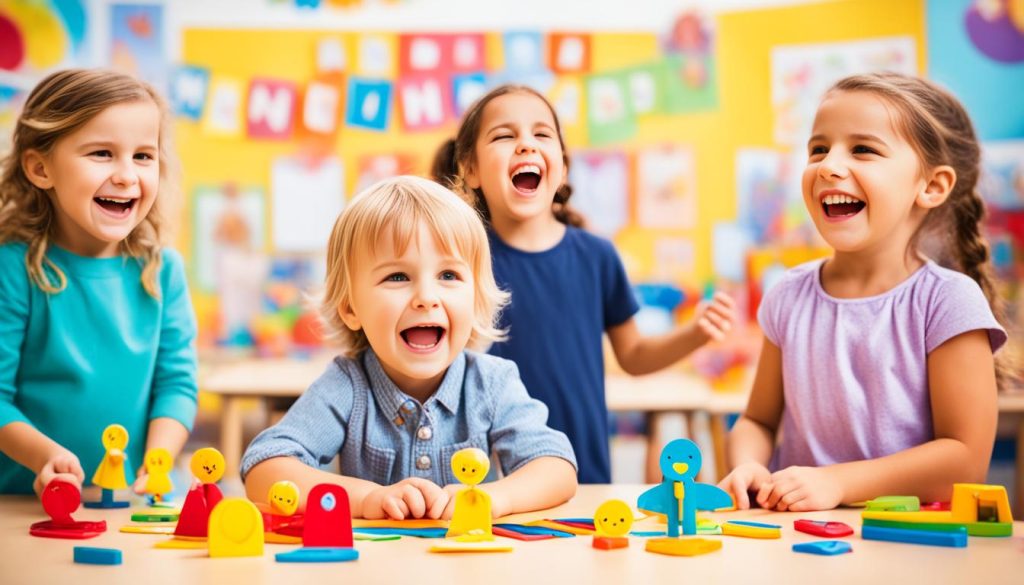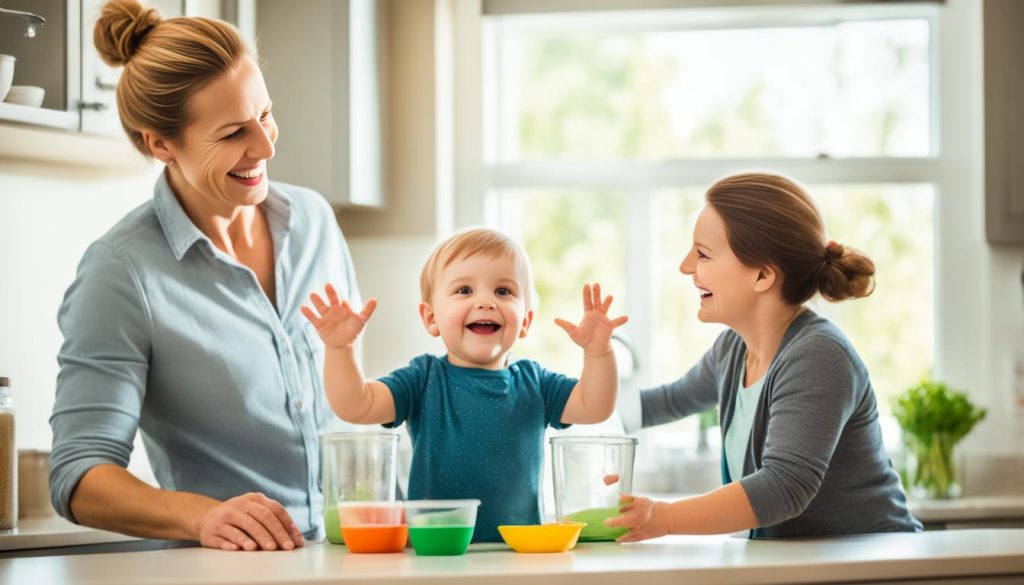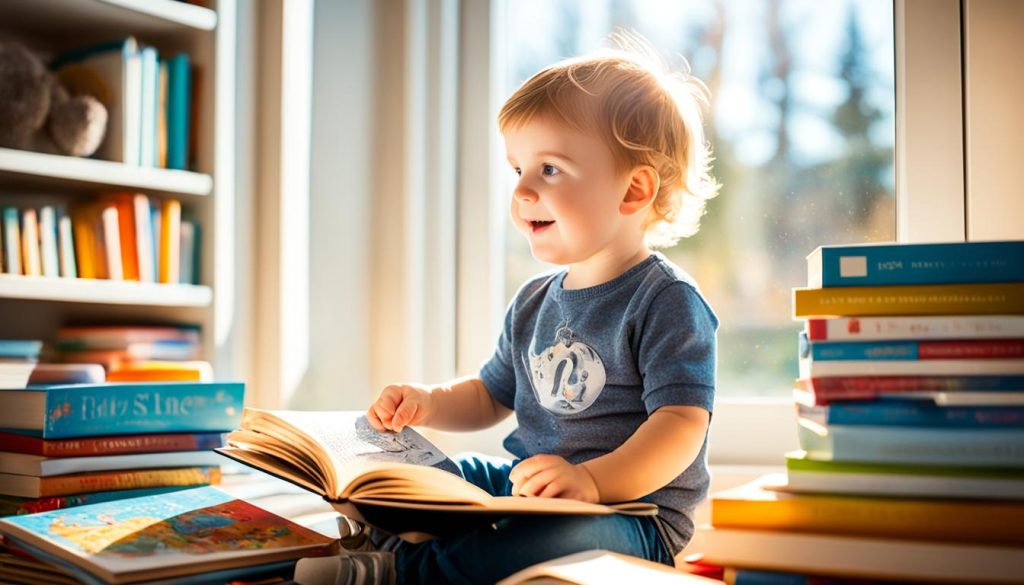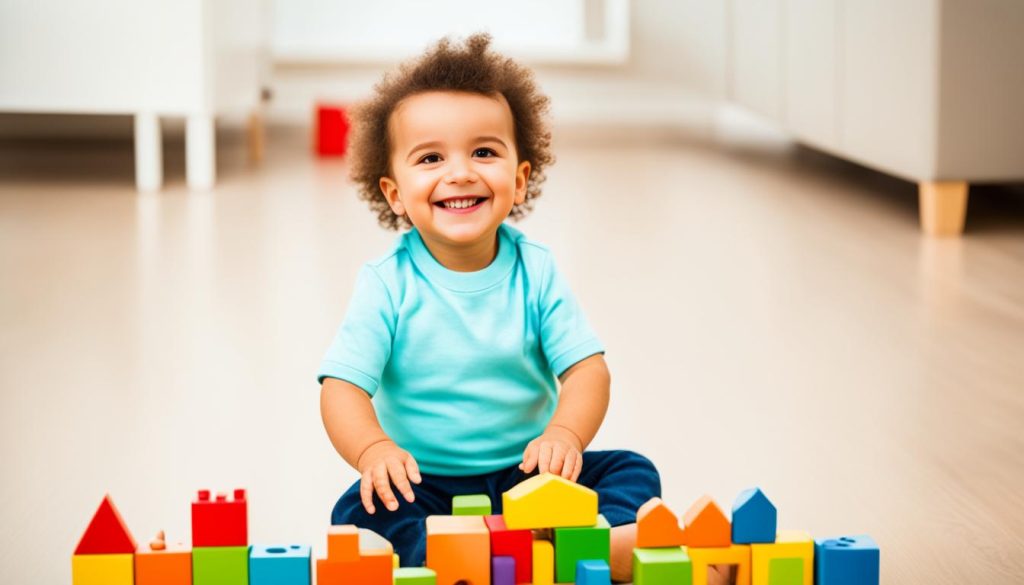Starting kindergarten is a big step in your child’s life, full of excitement and new friends. I remember feeling a mix of pride and sadness the night before my child started. It’s not just about getting ready for school; it’s about making sure your child feels confident and ready.
Every year, over 1 million children start kindergarten unprepared. But, there’s a lot you can do at home to help. Understanding child development and using good discipline strategies is key. Brian Smith, a kindergarten teacher, says focusing on social and academic skills helps a lot.
It’s important how your child feels too. Reading books like “Clifford Goes to Kindergarten” can help with separation anxiety. “How Do Dinosaurs Clean Their Rooms?” teaches kids to be independent. Using fun books and workbooks, like Scholastic’s Pre-K Extra Big Skills Workbook, makes learning fun.
Key Takeaways
- Introduce kids to books that foster social-emotional skills to help them interact well with peers.
- Focus on character-building stories such as “How Do Dinosaurs Clean Their Rooms?” to teach good habits.
- Utilize educational resources like Scholastic workbooks for sorting, matching, and counting activities.
- Practice routines and independence skills, including dressing up and bathroom hygiene, before school starts.
- Communicate clearly about after-school care arrangements to avoid anxiety and create a smooth transition.
Understanding Kindergarten Readiness
Kindergarten readiness is more than just learning ABCs and 123s. It’s about getting the whole child ready for school’s social and emotional challenges. Emotional Intelligence in Children and Setting Boundaries with Kids are key in this preparation.
Social-Emotional Skills
Teaching social-emotional skills is vital for a smooth kindergarten start.  and Building Self-Esteem in Children help kids do well in class. Reading books about feelings, playing with others, and talking about emotions can help kids manage their feelings and get along with friends.
and Building Self-Esteem in Children help kids do well in class. Reading books about feelings, playing with others, and talking about emotions can help kids manage their feelings and get along with friends.
Some schools, like the “Young 5s” in Ann Arbor, Michigan, help kids who turn five between May and December. These programs make the kindergarten transition easier by focusing on both feelings and learning.
Basic Academic Skills
Social skills are important, but so are basic reading and writing skills. Kindergartners should know their letters, write their names, and understand simple reading and sight words. These skills are key for doing well in school. Fun activities like alphabet games or writing their names can help kids get ready.
Studies show that kids who go to good childcare and preschool do better in school. Teachers say that kids who have been to school before find it easier to start kindergarten. Programs that help kids get ready for kindergarten, like pre-kindergarten, are really helpful.
State Policies and Entrance Requirements
Kindergarten rules and when kids can start vary by state in the U.S. For example, in Arizona, kids must be five by September 1 to start kindergarten. They must also be in school or an approved program by age six. It’s important for parents to know their state’s rules and when to sign up, as some schools start taking names in January.
Knowing these rules and what your child needs can help you decide if they’re ready for kindergarten. Helping kids with issues like anxiety or learning problems early on is key to making sure they can succeed.
Promoting Independence at Home
Encouraging your child to do small tasks helps them become more independent. Activities like cleaning up toys, helping with groceries, and picking up their room are great for this. These tasks teach them about responsibility.

Self-Help Skills
Teaching your child to do things on their own is key to fostering child independence. Skills like dressing, managing the bathroom, and keeping clean are crucial. Letting them get things for themselves, like cups or clothes, helps them act without needing you all the time. Encouraging them to do these things by themselves builds their confidence and self-reliance.
Daily Routines
Adding daily routines to your child’s day helps them feel more independent. Routines, like getting ready in the morning or getting ready for bed, make them know what to do next. This reduces conflicts and makes them feel secure. Giving them simple tasks like serving themselves at meals or packing their bags helps them feel more in charge. This lets parents support their kids in taking on more responsibilities and doing things on their own.
- Let them choose things in everyday tasks (like picking pajamas or snacks).
- Teach them life skills before they turn ten to help them be more self-sufficient.
- Give them praise for trying hard, not just for being perfect.
- Encourage them to solve problems on their own to build self-reliance.
Adlerian Psychology says the main job of caregivers is to help kids move from needing everything done for them to doing it all by themselves. Making your home a place that supports these practices will help your child grow into a capable person.
| Activity | Skill Developed | Impact |
|---|---|---|
| Cleaning up toys | Responsibility | Increases sense of contribution |
| Helping with groceries | Self-Reliance | Enhances decision-making |
| Packing school bags | Autonomy | Promotes self-sufficiency |
| Serving meals | Independence | Builds self-confidence |
Fostering a Love for Reading
Reading opens doors to learning and is key for early development. It helps grow a child’s creativity and love for learning. Parents can make reading fun by reading together every day and doing different literacy activities.

Read Aloud Sessions
Reading to kids boosts their listening and vocabulary skills. It introduces them to harder texts than they can read alone. A daily reading time, like before bed, can make reading a favorite activity. Listening to book podcasts also helps spark a love for reading.
Engaging in Literacy Activities
Activities like library trips, reading newspaper captions, and writing thank you cards help kids connect with stories. These activities are great for Encouraging Child Hobbies and Building Resilience in Kids. Reading events, setting up a reading corner, and talking about books can make reading more exciting. Parents should read with their kids for 10 to 15 minutes a day to help them love reading more.
Practicing Basic Math Concepts
Learning Basic Math Skills is key for every child’s school success. By teaching your child basic math early, you help them do well later on.

Adding Math Concepts for Kids to daily life can be fun. Counting toys, spotting shapes, and sorting things by size or color are great ways to make math fun. These activities help your child love learning math.
Every child learns differently, so use many ways to teach math. Here are some good methods:
- Use flashcards for numbers and shapes.
- Play counting games during daily tasks.
- Do puzzles and sort items.
- Help kids notice and compare numbers.
Teaching Developing Healthy Habits in Kids helps with math too. Routines and regular practice boost a child’s math skills. Here’s a plan for activities at home:
| Activity | Description | Benefits |
|---|---|---|
| Counting Objects | Using everyday items to practice counting. | Improves number recognition and sequence understanding. |
| Shape Sorting | Identifying and classifying shapes. | Enhances spatial awareness and categorization skills. |
| Puzzle Solving | Engaging in problem-solving puzzles. | Develops critical thinking and pattern recognition. |
| Comparing Quantities | Understanding concepts of more and less. | Builds basic arithmetic and analytical skills. |
These activities help your child learn math in a fun way. Using everyday moments and play, you can build a strong math foundation. This will help your child in school and later in life.
Developing Fine Motor Skills
Getting ready for kindergarten means learning fine motor skills. These skills help kids write, draw, and do classroom activities well. Studies say focusing on these skills early on is better than just learning letters and numbers.
Using Scissors and Glue
Scissors and glue need coordination and practice. That’s why fine motor skills development is key. Kids can improve these skills by doing crafts like cutting shapes and pasting them on paper.
Activities like playing with playdough and threading beads also help. These tasks make kids think harder and solve problems. They help kids learn to keep going and find solutions.
Holding Writing Instruments
How kids hold pencils and crayons matters a lot. The “Pinch and Flip” method helps them grip these tools right. Using wipe-clean books for tracing letters is also a fun way to improve skills.
Using both hands for tasks like threading beads helps with dexterity. It also lets kids be creative and try new things.
- Threading large beads
- Cutting out shapes
- Building a tower of 10 blocks
- Pasting things onto paper
- Buttoning and unbuttoning
- Working zippers
- Completing puzzles
- Manipulating pencils and crayons
- Copying shapes
Sorting colorful buttons by size or shape helps with finger dexterity. Doing these activities sets kids up for success in school. It helps with their fine motor skills.
Practicing these skills at home gets kids ready for school. It also teaches them to do things on their own. This builds confidence and a sense of achievement.
Teaching Social Skills and Manners
Getting your child ready for kindergarten means teaching them important social skills and good manners. Encouraging them to play together and showing them how to be polite are key steps. These steps help develop their social skills and teach them to respect others in the family.
Cooperative Play
Playing together is a great way to help kids learn how to get along. Activities like building with Lego or playing board games teach them about sharing and working together. Stories like “Clifford the Big Red Dog” and “Elephant and Piggie” also show the value of teamwork.
Through these games, you’re not just boosting their creativity. You’re also getting them ready for the social challenges they’ll face in school and life.
Good Manners
Good manners are more than just saying “please” and “thank you.” They’re about how kids talk to others and behave. It’s important to show them how to be polite and respectful yourself.
Role-playing at home helps kids practice being polite in different situations. For example, playing restaurant teaches them how to order and talk to the server. Writing thank you notes after gifts also teaches them to be grateful. These activities help them become better at social skills and support positive parenting.
According to the American Journal of Public Health, a child’s social and emotional skills in kindergarten could be a key predictor of success in adulthood.
By making these practices part of everyday life, you’re raising kids who are kind, respectful, and good with others. Understanding the importance of manners and teamwork prepares them well for kindergarten and the future.
Managing Separation Anxiety
Separation anxiety is a common issue for kids starting kindergarten. It usually starts around 9 months old. By age 3, kids know how their anxiety affects them when they’re apart. Parents need to be patient and consistent to help their kids feel better.
Creating goodbye rituals can help with separation anxiety. A consistent drop-off routine can make saying goodbye easier. Giving your child full attention and love during these times reassures them and strengthens your bond.
Books like “Clifford Goes to Kindergarten” can comfort kids and make them feel secure. Bringing a favorite book or family photo can also ease their anxiety. Talking about their feelings and understanding that it’s normal to feel scared helps a lot.
Siblings may also feel jealous during this time. Making sure each child feels important can reduce stress. Short practice separations can help kids become more confident and independent, easing their anxiety.
The table below shows when and how separation anxiety appears:
| Age Range | Separation Anxiety Characteristics |
|---|---|
| 4-5 months | Early signs of object permanence and separation anxiety |
| 6 months | Adjusts easily to other caregivers |
| 8-12 months | More uncertainty about being separated from a parent |
| 15-18 months | Challenges with separation anxiety become more apparent |
| 2-3 years | Understanding the impact of their anxiety; separation anxiety is rare daily after the preschool years |
In rare cases, kids may have intense separation anxiety into elementary school, showing a deeper anxiety disorder. If your child’s anxiety affects their daily life, it’s time to get professional help.
Building Confidence in Parenting and Raising Kids
Building confidence in parenting is key for both parents and kids. Positive parenting sets a strong base for your child’s future success and happiness.
Positive Reinforcement
Positive reinforcement is crucial in Effective Discipline Strategies. Praising efforts and specific achievements boosts a child’s self-esteem. It makes them feel important.
When you celebrate their small wins, you help their mental health and resilience grow. Studies show that praised kids feel more accomplished and confident in what they can do.
Encouragement and Support
Encouragement and support are big for building self-worth in kids. Talking openly with your child lets them share their feelings and thoughts. This helps them deal with problems better.
Talking about their strengths and the value of trying hard teaches them to handle failures well. You show them it’s okay to not be perfect, helping them feel more confident and mentally strong.
Letting your child help with tasks at home makes them feel responsible and part of the family. This approach makes them feel connected and able. Offering both challenges and successes, with your constant love and support, boosts their self-esteem and confidence.
Introducing the Concept of Responsibility
Teaching kids about responsibility early on is key. Giving them small chores at home is a great way to start. This helps them learn about being accountable and doing their part. It also boosts their mental health and emotional smarts.
For instance, choosing healthy foods and products for your kids shows you care about their well-being. This is part of a bigger trend towards health awareness in families.
learn more about supporting your child’s mental health.
Small Household Chores
Giving kids tasks like cleaning their room or putting away clothes teaches them about duty. Being there for your kids shows you support their growth. It’s also key to teach them to be thankful, which goes hand in hand with responsibility.
Organizational Skills
Setting up systems for kids to keep their stuff organized helps with their organizational skills. Apps for older kids can take it to the next level. This not only helps them now but also prepares them for managing money later on.
Teaching kids good manners through routines and helping out at home sets a good example. It shapes their behavior and prepares them for the future.
-
Toddlers aged 1-3 years start mimicking behaviors of adults, which is crucial for their early cognitive and social development.
-
Preschoolers aged 3-5 years can understand the concept of responsibility more clearly.
-
School-age children aged 6-12 years are ready for more significant responsibilities and can manage school-related tasks and complex household chores.
-
Teenagers aged 13 years and above are capable of handling substantial responsibilities and should be encouraged to take on tasks that require greater independence.
Getting kids involved in daily tasks teaches them the value of helping out. It sets good habits for school and beyond. This shows the perks of outdoor play in raising responsible kids.
| Age Range | Responsibility Level |
|---|---|
| 1-3 Years | Simple imitation of adult behaviors |
| 3-5 Years | Basic understanding of responsibility |
| 6-12 Years | Handling significant school and home tasks |
| 13+ Years | Managing substantial responsibilities independently |
By teaching kids these responsibilities at different ages, parents can help them grow into capable adults. This method strengthens the idea of responsibility and adds other important skills to their life.
Conclusion
Getting your child ready for kindergarten is a big step. It’s about getting them ready in many ways, like learning, making friends, being independent, and feeling good about themselves. By teaching them basic math and reading, and making them love to learn, you’re helping them for life.
It’s also key to balance work and family life. Keeping open talks with your child helps a lot. And, let them have their hobbies to keep them happy and creative.
Parents say that feeling close, setting rules, and teaching right values matter a lot. This way, kids can handle kindergarten and more. With caring and positive parenting, your child will do well in school and with friends.
The main aim is to make a caring place for your child to grow. They’ll learn to know who they are, make good friends, and love learning. By focusing on both doing well in school and having a full childhood, you’re helping your child grow and succeed.
FAQ
How can I prepare my child for kindergarten?
What are the key social-emotional skills required for kindergarten readiness?
What basic academic skills are important for my child to develop before starting kindergarten?
How can I promote independence at home for my kindergartener-to-be?
What are effective daily routines to prepare my child for school?
How can I foster a love for reading in my child?
What basic math concepts should my child understand before starting kindergarten?
How can I help my child develop fine motor skills?
What social skills and manners should my child have before kindergarten?
How can I manage my child’s separation anxiety when starting kindergarten?
How do positive reinforcement and encouragement support my child’s readiness for kindergarten?
How can I introduce the concept of responsibility to my kindergartener?
This post contains affiliate links. If you click on a link and make a purchase, I may earn a small commission — at no extra cost to you. Thank you for supporting this blog and helping me keep the patterns free! Read the full Affiliate Disclosure & Transparency.
